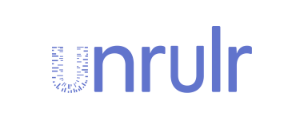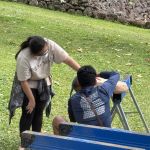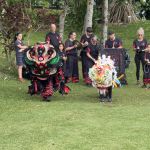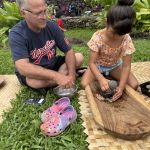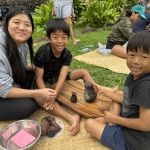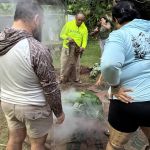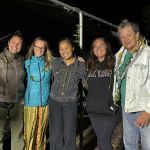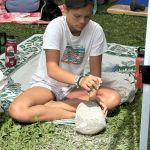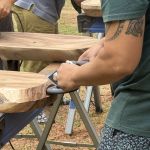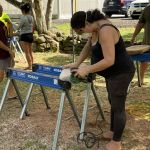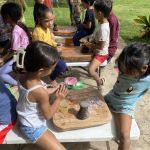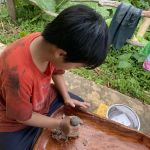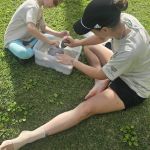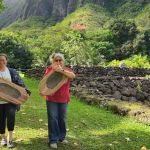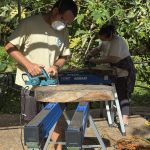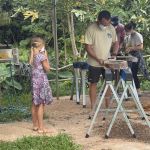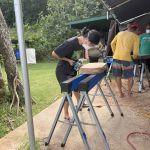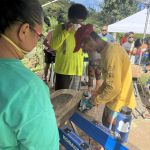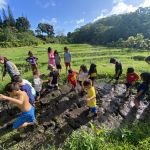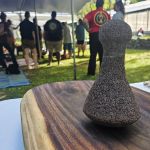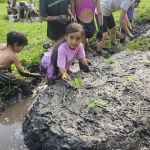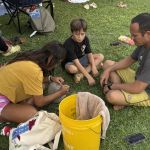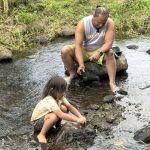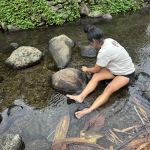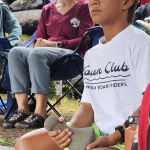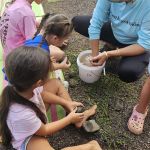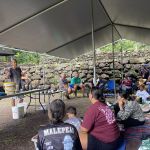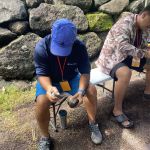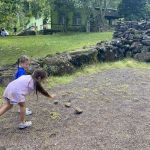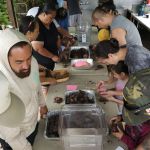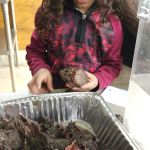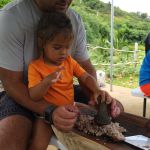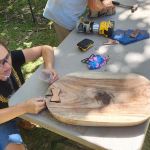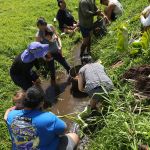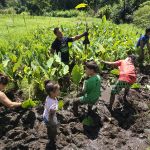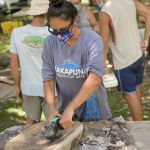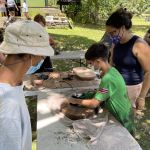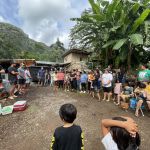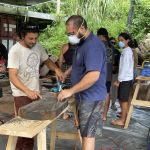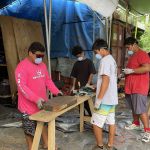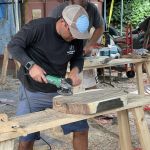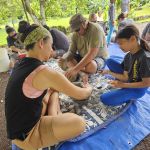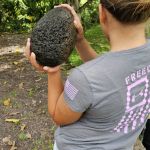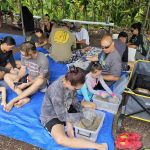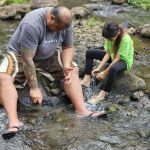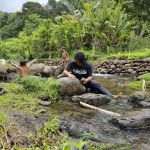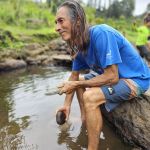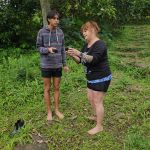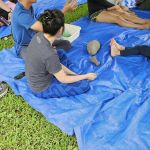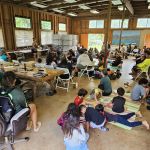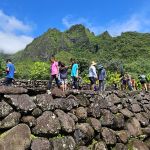Kalo kanu o ka ‘āina. Taro has been planted on the land for generations (Puku‘i). This ‘Ōlelo No‘eau refers to the kanaka that have thrived on this ‘āina for generations. The Kalo is seen as the elder brother of kanaka. Kalo has sustained the Hawaiian people for generations and today we mālama this plant because we respect it as our kūpuna. The consumption of kalo as poi brings an ‘ohana together as we share in sustenance with our ancestors. Pōhaku kuʻi ʻai and papa kuʻi ʻai are the tools needed to make paʻi ʻai and poi out of cooked kalo. It is our kuleana to mālama the kalo and in turn it will feed and nourish all of us.
Cultural Practitioners
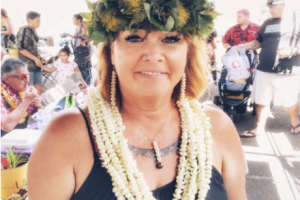
KAWAILANI SOMA
Kawailani Soma is a Hawaiian cultural practitioner in the practices of lāʻau lapaʻau, kālai pōhaku, ʻŌlelo Hawaiʻi and mālama pōhaku. Her inoa ʻohana is Lenchanko and Kea. She is the mother of 9 keiki and 24 moʻopuna all of who have been raised with the Hawaiian language and culture. In 1995 she was accepted as a haumana to Poʻokela Papa Henry Auwae where lāʻau lapaʻau became one of the biggest blessings of her life. Her teachings, it has led her to become the alakaʻi of Nā Pōhaku Ola, the healing stones which rest on the shores of Waikīkī. Her ʻohana kuleana is also to mālama Kūkaniloko, the birthing stones which sit in the piko of Oʻahu at Wahiawā.
Her teaching journey has led to many different opportunities within the DOE teaching Hawaiian studies and culture at various schools, Kaleiopuʻu Elementary, Nānākuli High and Intermediate, and Ke Kula Kaiapuni o ʻĀnuenue to name a few. She was introduced to the art of kālai pōhaku and papa kuʻi ʻai by Vince Kanaʻi Dodge who she has continued to work with in various capacities. Her passion for kalo and kuʻi kalo began with her keiki attending Ke Kula Kaiapuni oʻĀnuenue and their experiences and teachings with Uncle Eddie Kaʻanana. Kawailani believes that lāʻau lapaʻau, pōhaku and culture is a way of life and of great value. It is not something that you just do, it is who we are and how we live.
VINCE KANA’I DODGE
Vince Kanaʻi Dodge is an educator, cultural practitioner, mahiʻai, lawaiʻa, and longtime resident of Wai‘anae. He is the son of Aiko Tanaka and Fred Dodge, the father of Daniel Anthony and Chisa Dodge, and a papa to 8 moʻopuna. He is an ʻāina food producer of Waiʻanae Gold Kiawe mea ʻai. He has been a mahiʻai kalo since 2000 and has since passed on this Hawaiian cultural practice to his ʻohana. Kanaʻi has been a practitioner of kuʻi kalo since 1991 and in 1994 he began practicing the art of kālai pōhaku kuʻi ʻai and papa kuʻi ʻai. In 2003 his practice of carving pōhaku extended into making ʻulu maika. His teaching journey began as a substitute teacher within the DOE Leeward District in 1989 and in 1996 he became the Director of ʻAi Pōhaku Workshop, a hands-on cultural and academic skill-building workshop for students from 5th grade through high school until 2010. He continues to innovate Hawaiian cultural practices through traditional methods using modern technologies to bring knowledge and awareness of ʻike kūpuna to haumana of all ages.
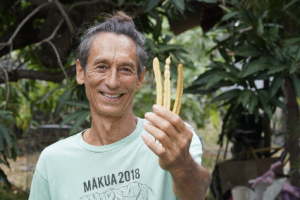
March 8-9, 2025
This weekend we had the pleasure of hosting a celebration for our ʻohana that filled our ʻōpū, poli and naʻau. From beginning to end it was non-stop excitement and learning. Between learning to add pewa, closing imu and learning the Hawaiian navigational compass, there was never a dull moment. We’d like to extend a great big mahalo to the Tom ʻohana for bringing blessings with their Chinese lions, as well as all the ʻohana and staff who helped make this event a success. As we move on to our last module we are delighted to watch our community continue to grow, learn and thrive together.
February 8, 2025
Rounding out this module, our ohana rounds out their papa kuʻi ʻai. Finishing up on their kalo mea, the keiki learn to use the papa and pōhaku to kuʻi kalo after spending some time in the loʻi as they mālama hāloa. As the sawdust settles on another completed module, we look forward to the sound of stone on wood as our families feed generations.
January 11, 2025
Here at Papahana we are starting off the year with the roaring sound of power tools. Cohort Two begin working on their papa kuʻi ʻai in teams with the help of members from Cohort One, Kanaʻi and Keoni. As they power through, the other ʻohana and their keiki mālama hāloa and continue to work on their pōhaku kuʻi ʻai. As we settle into our last year together we are so pleased to see our ʻohana working together and creating connections to each other and this space that will last a lifetime.
December 14, 2024
Ending off the year and this holiday season with some friends, laughter and hana. While some ʻohana continue working on their pōhaku kuʻi ʻai, Others take some time to mālama the loʻi which house our precious ancestor and traditional food source. We look forward to all the new lessons and memories the new year will bring.
November 9, 2024
Pili Ka Moʻo is so pleased to have Kanaʻi and Kawailani return to hana hou their lessons on kā lai pōhaku or stone on stone carving. The keiki try their hand at carving ulu maika as their makua in Cohort Two have started working on their pōhaku kuʻi ʻai. Once complete it will help feed their families for generations to come. Mahalo to Cohort one for their support and kōkua as their fellows embark on this new adventure.
September 9, 2023
ʻOhana continue to work on completing their papa kuʻi ʻai with our cultural
AUGUST 12, 2023
ʻOhana continue to work on completing their papa kuʻi ʻai with our cultural practitioners Kumu Kanaʻi and Kumu Kawailani. Some families got some “taropy” and helped Kaʻimi with harvesting kalo for our upcoming hōʻike. They learned how to harvest, clean, process kalo, and kilo their parts to identify their variety, referencing Kealaulaʻs virtual presentation. About 60 pounds of 5 varieties of kalo were harvested and processed that day!
JULY 8, 2023
Poi-pounding entrepreneur Daniel Anthony, son of Kumu Kanaʻi, opens his home for our ʻohana to begin their journey in making and shaping their family papa kuʻi ʻai. They are trained and directed by Daniel to use different machinery and tools that were new for the majority of our ʻohana. In their journey, they are experiencing traditional and modern methods of making their pōhaku and papa kuʻi ʻai.
JUNE 10, 2023
ʻOhana move to bigger projects with kālai pōhaku, making their family pōhaku kuʻi ʻai. They listen to pōhaku calls from our kahawai or their wahi, and carve and shape their pōhaku with guidance and support from Kumu Kanaʻi. Here in Waipao we hear an orchestra and symphony of pōhaku echoing throughout our Haʻikū valley.
MAY 13, 2023
Kumu Kawailani continues to share with our families her aloha for pōhaku through storytelling about her personal experiences. Our families kilo and observe our kahua, seeing the different types of pōhaku. ʻOhana collaborate with each other and our cultural practitioners, telling stories about their experiences and journey in their kālai pōhaku journey.
APRIL 8, 2023
Our ʻohana begin their journey with building pilina to our wahi of Waipao and to pōhaku. Kumu Kawailani spoke about her experiences and the importance of our relationship with pōhaku. Kumu Kanaʻi teaches us about kālai pōhaku, the Hawaiian cultural practice and art of carving stone. Our families visit our kahawai and embark on making their ʻulu maika.


